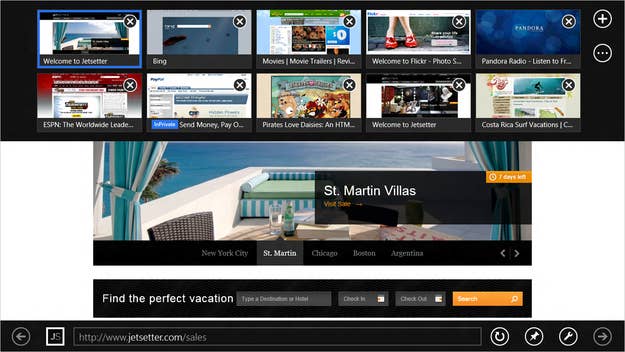I used to care about my browser. I used to care about my parents' browser, my friends' browsers, and internet strangers' browsers. And, not to get defensive, I think there was a time when it made sense to care — when using the wrong one was the fastest ticket to a broken computer. When the best was measurably better than the worst. When there even was a best.
The last three months were the first in years that Internet Explorer didn't lose share to Firefox or Chrome. In March, Microsoft's browser share even grew by one percent. In the context of the Browser War this would have been big news. But while Google and Microsoft and Firefox are still fighting, it's not clear what they're after. The browser wars just don't matter anymore.
The browser wars are ending because there's nothing left to fight for. The stakes were higher when features were actually different — there was a time when the most popular browser in the world was the only one without tabs — but the basics are trivial at this point. All the major browser engines can show you the pages you want without breakage, and do so without making you wait. They all have tabs that work in predictable and similar ways and they all support plugins, which, anyway, aren't really important to most people. They're becoming dumb conduits, which was what they were striving for all along — you know, to get out of the way, to never demand attention. That's what progress is in consumer tech.

This is what Internet Explorer looks like in Windows 8, which is due out later this year. It's stripped down in the style of Mobile Safari and, for the most part, gets out of the way. During the limited time I've spent with it, it's rendered pages correctly, which is all anyone will ever ask of it.
Similarly, the latest version of OS X encourages users to go fullscreen, such that the browser becomes literally invisible. I wouldn't be surprised if the next version of OS X, or the one after that, took a cue from iOS and integrated Safari into the OS so deeply that the concept of an "alternative browser" wouldn't even really make sense.
The modern web isn't made of websites, it's made of apps. The next versions of the operating systems will write the discreet "browser" out of existence. They'll pull web apps so close that we'll barely be able to tell the difference.
That's how the browser wars will end: not with a bang or even a victor, but with a batch of software updates.
